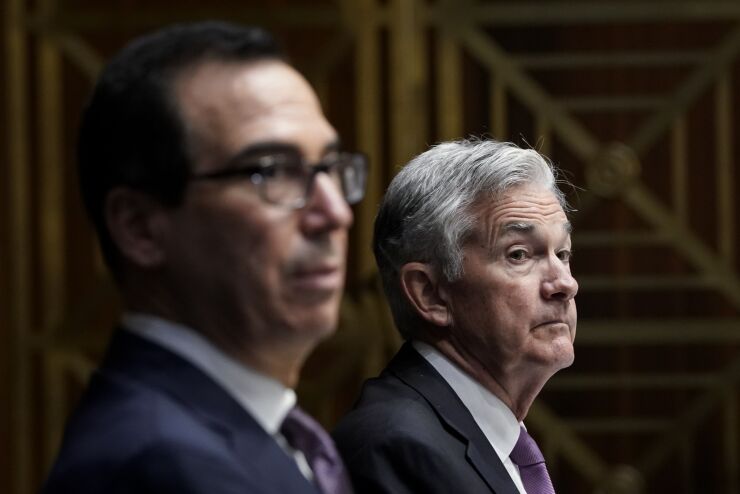WASHINGTON — Federal Reserve Chairman Jerome Powell and Treasury Secretary Steven Mnuchin highlighted the limits of their authorities to limit the economic fallout of the coronavirus crisis as hope for more congressional stimulus appears dim.
Powell and Mnuchin, testifying before the Senate Banking Committee on their pandemic response under the Coronavirus Aid, Relief and Economic Security Act, urged Congress to pass legislation to provide more targeted fiscal support. They emphasized that they don’t have the authority to reallocate CARES Act funds or provide direct assistance to small businesses on their own.
“While the economy has been doing better than expected, I think there's downside risk to that if there is no further fiscal support,” Powell said.
His remarks came as Goldman Sachs analysts said Thursday that they no longer expect Congress to enact more fiscal relief before the end of the year, leading them to slash Goldman's forecast for fourth-quarter growth in the gross domestic product.

“Most Americans can’t afford to wait any longer,” said Sen. Sherrod Brown, D-Ohio, the committee’s ranking member. “We are up against a global health crisis that will spiral into a global economic crisis unless we act now. We are facing a challenge that requires this government to be at its best, to work together to do big things.”
Lawmakers probed the possibility of the Fed expanding its Main Street Lending Program to commercial real estate borrowers and providing more support to states and local governments through the Fed’s Municipal Liquidity Facility — actions that Powell and Mnuchin said are more appropriate for Congress.
“We think those industries don't need more debt. What they need is economic relief because they're shut down as a result of COVID,” Mnuchin said. He suggested that Congress explore restarting the Paycheck Protection Program, which provided forgivable loans to small businesses through the Small Business Administration, but expired in August.
Republicans and Democrats broadly agree that more fiscal stimulus is necessary, but discussions around enhanced unemployment benefits and funding for state and local governments have held up a larger package. Lawmakers have been unable to pass any piecemeal legislation even on items that they mostly agree on, like extending PPP.
“At this point, I personally believe that we have not had the willingness from the other side to engage in a reasonable package, and that the demands continue to be, ‘Our way or the highway,’ ” said Senate Banking Committee Chairman Mike Crapo, R-Idaho. “And frankly, I believe that there are many items that we have already reached agreement on, or which we could reach agreement on very rapidly.”
But there is not much else the Fed can do to prop up the economy on its own, Powell indicated. He added even that some of the funding that Congress had appropriated for the Main Street Lending Program could be better used elsewhere.
“To me it would be PPP… and then after that, I would say something more for those who remain unemployed,” he said, suggesting where the leftover money should go.
Mnuchin also mentioned he has asked for congressional authority to reallocate $200 billion of the $454 billion appropriated to Treasury's Exchange Stabilization Fund. The fund served as a backstop for the Fed’s emergency lending facilities and has provided loans to distressed businesses, but has not been fully tapped.
“The $500 billion Treasury slush fund isn’t making it to Main Street businesses,” said Sen. John Tester, D-Mont. “What about the restaurants, the gyms and venues and breweries and distilleries or seasonal businesses and others who are bearing the brunt of this crisis?”
Mnuchin responded that if the money were in fact a Treasury "slush fund," he “would reallocate it to help those businesses immediately.”
“But unfortunately, I need congressional authority,” he continued. “There's also $130 billion of unspent money in the PPP, so I would encourage that we work together in a bipartisan basis to specifically help the types of small businesses that you're referring to.”
Several senators also pressed Mnuchin on the forgiveness process for PPP loans, which has proved
“South Dakotans have been overwhelmingly supportive of the relief that the PPP brought to small businesses,” said Sen. Mike Rounds, R-S.D. “Recently, however, I've started to hear concerns from dozens of business owners and bankers who have experienced challenges with the PPP forgiveness portal.”
Treasury did create “an easy form” for loan forgiveness, said Mnuchin, although he added that he would work with the SBA to simplify the process even further for small borrowers.
“I know there is bipartisan support for going much further, which we think we need legislation for, and we would support, if there is legislation to have loans under $150,000 have a presumption [of forgiveness] but allow for us to audit them as needed,” he said.





